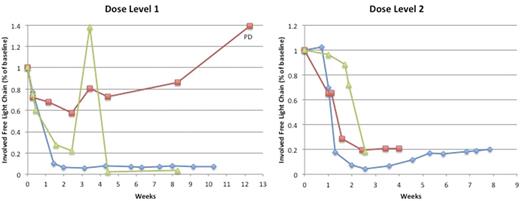Abstract
Patients with relapsed/refractory MM (RRMM) rarely obtain durable remissions with available therapies. Clinical use of BCMA targeted CAR T cell therapy was first reported in 12/2015 for RRMM, and based on small numbers, preliminary results appear promising. Given that host immune anti-murine CAR responses have limited the efficacy of repeat dosing (Turtle C. Sci Trans Med 2016), our goal was to develop a human BCMA targeted CAR T cell vector for clinical translation.
We screened a human B cell derived scFv phage display library containing 6x1010 scFvs with BCMA expressing NIH 3T3 cells, and validated results on human MM cell lines. 57 unique and diverse BCMA specific scFvs were identified containing light and heavy chain CDR's each covering 6 subfamilies, with HCDR3 length ranges from 5-18 amino acids. 17 scFvs met stringent specificity criteria, and a diverse set was cloned into CAR vectors with either a CD28 or a 4-1BB co-stimulatory domain. Donor T cells transduced with BCMA targeted CAR vectors that conveyed particularly desirable properties over multiple in vitro assays, including: cytotoxicity on human MM cell lines at low E:T ratios (>90% lysis, 1:1, 16h), robust proliferation after repeat antigen stimulation (up to 700 fold, stimulation q3-4d for 14d), and active cytokine profiling, were selected for in vivo studies using a marrow predominant human MM cell line model in NSG mice. A single IV injection of CAR T cells, either early (4d) or late (21d) after MM engraftment was evaluated. In both cases survival was increased when treated with BCMA targeted CAR T cells vs CD19 targeted CAR T cells (median OS at 60d NR vs 35d p<0.05). Tumor and CAR T cells were imaged in vivo by taking advantage of luciferase constructs with different substrates. Results show rapid tumor clearance, peak (>10,000 fold) CAR T expansion at day 6, followed by contraction of CAR T cells after MM clearance, confirming the efficacy of the anti-BCMA scFv/4-1BB containing construct.
Co-culture with primary cells from a range of normal tissues did not activate CAR T cells as noted by a lack of IFN release. Co-culture of 293 cells expressing this scFv with those expressing a library of other TNFRSF or Ig receptor members demonstrated specific binding to BCMA. GLP toxicity studies in mice showed no unexpected adverse events. We generated a retroviral construct for clinical use including a truncated epithelial growth factor receptor (EGFRt) elimination gene: EGFRt/hBCMA-41BBz.
Clinical investigation of this construct is underway in a dose escalation, single institution trial. Enrollment is completed on 2/4 planned dose levels (DL). On DL1 pts received cyclophosphamide conditioning (3g/m2 x1) and 72x106 mean CAR+ T cells. On DL2 pts received lower dose cyclophosphamide/fludarabine (300/30 mg/m2 x3) and 137x106 mean CAR+ T cells. All pts screened for BCMA expression by IHC were eligible. High risk cytogenetics were present in 4/6 pts. Median prior lines of therapy was 7; all pts had IMiD, PI, high dose melphalan, and CD38 directed therapies. With a data cut off of 7/20/17, 6 pts are evaluable for safety. There were no DLT's. At DL1, grade 1 CRS, not requiring intervention, occurred in 1/3 pts. At DL2, grade 1/2 CRS occurred in 2/3 pts; both received IL6R directed Tocilizumab (Toci) with near immediate resolution. In these 2 pts time to onset of fever was a mean 2d, Tmax was 39.4-41.1 C, peak CRP was 25-27mg/dl, peak IL6 level pre and post Toci were 558-632 and 3375-9071 pg/ml, respectively. Additional serum cytokines increased >10 fold from baseline in both pts include: IFNg, GM CSF, Fractalkine, IL5, IL8, and IP10. Increases in ferritin were limited, and there were no cases of hypofibrinogenemia. There were no grade 3-5 CRS and no neurotoxicities or cerebral edema. No pts received steroids or Cetuximab. Median time to count recovery after neutropenia was 10d (range 6-15d).
Objective responses by IMWG criteria after a single dose of CAR T cells were observed across both DLs. At DL1, of 3 pts, responses were 1 VGPR, 1 SD, and 1 pt treated with baseline Mspike 0.46, thus not evaluable by IMWG criteria, had >50% reduction in Mspike, and normalization of K/L ratio. At DL2, 2/2 pts had objective responses with 1 PR and 1 VGPR (baseline 95% marrow involvement); 1 pt is too early to evaluate. As we are employing a human CAR, the study was designed to allow for an optional second dose in pts that do not reach CR. We have treated 2 pts with a second dose, and longer follow up data is pending.
Smith: Juno Therapeutics: Membership on an entity's Board of Directors or advisory committees, Patents & Royalties: BCMA targeted CAR T cells, Research Funding. Almo: Cue Biopharma: Other: Founder, head of SABequity holder; Institute for Protein Innovation: Consultancy; AKIN GUMP STRAUSS HAUER & FELD LLP: Consultancy. Wang: Eureka Therapeutics Inc.: Employment, Equity Ownership. Xu: Eureka Therapeutics, Inc: Employment, Equity Ownership. Park: Amgen: Consultancy. Curran: Juno Therapeutics: Research Funding; Novartis: Consultancy. Dogan: Celgene: Consultancy; Peer Review Institute: Consultancy; Roche Pharmaceuticals: Consultancy; Novartis: Consultancy, Membership on an entity's Board of Directors or advisory committees; Seattle Genetics: Consultancy, Membership on an entity's Board of Directors or advisory committees. Liu: Eureka Therpeutics Inc.: Employment, Equity Ownership, Membership on an entity's Board of Directors or advisory committees, Patents & Royalties. Brentjens: Juno Therapeutics: Consultancy, Membership on an entity's Board of Directors or advisory committees, Patents & Royalties, Research Funding.
Author notes
Asterisk with author names denotes non-ASH members.


This feature is available to Subscribers Only
Sign In or Create an Account Close Modal